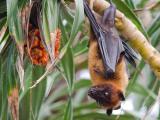The Coalition for Epidemic Preparedness Innovations (CEPI) launched today at the World Economic Forum in Davos, Switzerland, with $460 million in funding and an initial focus on developing vaccines against MERS, Lassa, and Nipah virus.
CEPI, a strategic vaccine development partnership, was created in the wake of the 2013-2016 Ebola outbreak as a way to rapidly develop vaccines for emerging infectious diseases.
"What CEPI is doing is providing a proof-of-concept approach to making world better prepared for new infectious agents," said Michael Osterholm, PhD, MPH, director of the Center for Infectious Disease Research and Policy at the University of Minnesota, publisher of CIDRAP News. Osterholm served on the planning committees that helped CEPI develop its initial vaccine targets. "I very much applaud this activity and how it reconsiders how we license and deploy these vaccines."
Billing itself as the world's insurance policy against new infectious diseases, CEPI will be based in Oslo, with offices in the United Kingdom, India, and the United States. The governments of Germany, Japan and Norway, plus the Bill & Melinda Gates Foundation and the Wellcome Trust have funded CEPI with an initial $460 million, and the organization plans to raise $1 billion within 5 years.
Two vaccine candidates per target
According to a press release from the Wellcome Trust, CEPI will shorten the time it takes to develop new vaccines by, "capitalizing on exciting developments in adaptable vaccine technology and investing in facilities that could respond quickly to previously unknown pathogens."
In a commentary yesterday in The Lancet, CEPI-affiliated scientists said, "This emphasis on preventing and preparing for outbreaks, epidemics, and pandemics comes at a time when globalisation, urbanisation, and environmental and climate change mean that infectious diseases are increasingly global threats that respect no borders.
"Health protection is therefore dependent on investing collectively in global health security. The chain is no stronger than its weakest link."
CEPI's initial targets will be two vaccine candidates each against MERS-CoV (Middle East respiratory syndrome coronavirus), Lassa, and Nipah. All of these diseases have the potential to cause serious epidemics, the organization said. In today's globalized world, "local" diseases like MERS and Lassa can rapidly turn into global outbreaks, in the same way Ebola and Zika have.
In the Wellcome Trust release, Bill Gates, co-chair of the Bill and Melinda Gates Foundation, said, "Ebola and Zika showed that the world is tragically unprepared to detect local outbreaks and respond quickly enough to prevent them from becoming global pandemics. Without investments in research and development, we will remain unequipped when we face the next threat."
Since 2012, MERS-CoV has caused 1,879 cases worldwide, and 666 deaths, according to the World Health Organization (WHO). The vast majority of cases are concentrated in Saudi Arabia. Lassa fever is a deadly hemorrhagic fever that has killed 160 people in West Africa (mainly Nigeria) since 2015. Nipah virus, which is spread by fruit bats, is a newly emerging threat that's been found in Malaysia. Infection with Nipah can cause fatal encephalitis.
The 3 initial targets are among the 11 emerging infectious diseases the WHO has said are the most capable of causing global epidemics.
Attempt to end fragmented approach
A CEPI commentary yesterday in the New England Journal of Medicine describes some of the problems inherent with new vaccines against emerging threats.
"Since we generally have poor clinical vaccine-development pipelines for epidemic infectious diseases, such diseases can emerge and spread faster than we can successfully develop vaccines," the CEPI experts said.
"Platform technologies that could reduce development times in an emergency are often not validated for human use in advance, which delays the start of clinical trials. . . . And regulatory pathways are not easily adaptable to epidemic contexts, especially in regions with weaker regulatory capacity and where outbreaks are more likely."
"Current vaccine-development efforts are fragmented, with no sustainable mechanism to support them across national borders and direct them toward global epidemic risks."
CEPI's inception came 1 year ago at the 2016 World Economic Forum. From February to June of 2016, three task groups consisting of experts in the field of public health and vaccine development met to develop initial targets and goals. So far, 80 organizations and more than 200 individuals have collaborated to create the organization.
See also:
Jan 18 Wellcome Trust press release
Jan 18 Lancet commentary
Jan 17 WHO MERS update
WHO Lassa page
WHO Nipah page
Jan 18 N Engl J Med commentary
CEPI home page




















